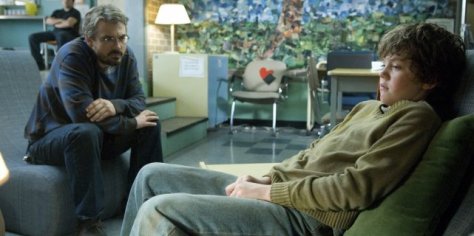
The Enigma of Kaspar Hauser is a very strange movie that raises more questions than it answers, confounds even the most open-minded viewer, and is insistently vague throughout. That said, it is worth watching for it’s unique portrayal of it’s titular hero and, by extension, the whole of the human race. It’s a secular fable for the cinematically adventurous, written and directed by the king of weird and polarizing art house films, Werner Herzog.
I have to admit, I’m not that familiar with Herzog’s directorial work. I’ve seen a couple of his films, but I mostly know him as the weird guy in Julien Donkey-Boy who chugs cough syrup while wearing a gas mask and sprays Ewen Bremner down with cold water while bafflingly screaming “Stop your moody brooding. Don’t shiver! A winner doesn’t shiver!” As you might have guessed, my experience with Herzog has been strange and surreal, and while Kaspar Hauser does not reach the heights of outlandishness of Julien Donkey-Boy, it’s got plenty of unnerving to go around. It’s allegedly inspired by a real case that took place in the 19th century, very closely based upon a series of letters written on the subject around that time.
Kaspar Hauser (Bruno Schleinstein) is a misfit. He’s spent his entire life in the basement of a man (Hans Musäus) who calls himself his ‘daddy,’ where he is only given a toy horse to play with and is beaten frequently. The only word he knows is ‘horsey.’ He eats nothing but bread and water and is virtually unable to walk or move in a typical human manner. I immediately drew parallels between Kaspar and Nicholas Hope’s character in Rolf de Heer’s Bad Boy Bubby, but poor Kaspar has it even worse than the titular Bubby, having been shackled to a wall for seventeen years.
Even more disturbing is the fact that it is never explained why the man is keeping him there. Is he incarcerated for sexual purposes? Is his captor just batshit insane? Is the sick appeal of keeping a man chained to a wall his whole life a turn-on in of itself? We really don’t know. And that makes the final moments of the movie even more insanely cryptic. But for whatever reason, the man gets sick of having Kaspar around and dumps him in a small German town to fend for himself, standing stock still and without purpose with a letter in one hand and a holy book in the other.

When Kaspar is ‘rescued’ only to be placed in a local jail for lack of anything better to do with him, they assume he is both utterly mentally deficient and incompetent. A kind man named Professor Daumer (Walter Ladengast) gets custody of Kaspar for the time being and begins to teach him how to function in society. The irony in this is that Kaspar soon begins to seem wiser and more genuine than any of the hoity-toity high society dandies who superficially observe his story.
He’s prone to be a bit of a philosopher, despite his odd appearance and slow halting speech. Kaspar is a delightful character, because he makes all the religious and moral authorities angry by taking all the demands that he be a proper human and a God-fearing Christian at face value. He’s a wise fool, someone whose ignorance actually lends him a less biased, more realistic view of life. He displays a soul by weeping at music that strikes him as beautiful, yet his elders can’t put him in a tidy box or clearly define him.
I have several problems with this movie, including the lead actor being portrayed as a teenage boy. Seventeen years old? More like a middle-aged Hobbit lookalike! (in fact, Schleinstein, a bit of a social outcast himself, was forty-one at the time of filming.) Jests aside, though, Scheinstein gives a effective, if somewhat one-note, performance. I also have to say that I was simply baffled by the ending. It was quite sad and, furthermore, was totally out of the blue. I think I would have preferred an ending that wasn’t so infuriatingly cryptic.
This is my favorite Werner Herzog (having seen My Son My Son What Have Ye Done and Signs of Life, neither of which struck me as particularly outstanding or memorable.) I don’t love this movie, but for better or worse, I think I’ll remember it.
In creating a unique and memorable character in Kaspar Hauser, the movie allows us to see life through an unbiased, unprejudiced lens- a lens truly untainted by worldly experience. Kaspar is like a blank slate onto which other characters try to project their beliefs and opinions, but, as inert and seemingly mindless as he is, he refuses to be a sheep for other people to control. He’s strong in a way that seems unlikely for someone of his kind, someone without influence, experience, or familial love. And we love him for it. Unsentimental and brazen, The Enigma of Kaspar Hauser is, in essence, an enigma, and one that might warrent repeat viewings. It might not be a particularly palatable film for the mainstream, but it has it’s astonishing moments.























